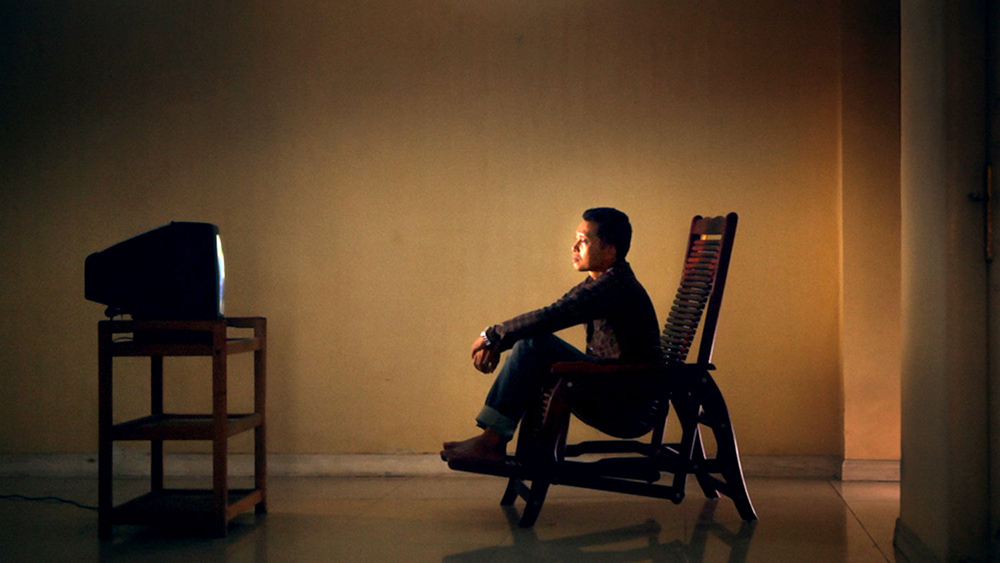In The Look Of Silence, An Indonesian Man Confronts The Mass Murderers Who Killed His Brother.
The Look of Silence.
Director: Joshua Oppenheimer,
Where It's Playing: Texas Theatre (starting Friday).
When Joshua Oppenheimer's The Act of Killing came out three years ago, it blew pretty much everyone away.
The subject matter basically guaranteed that: In Killing, Oppenheimer followed around leaders of the military coup from Indonesia as they dramatically recreated for film the murders they committed towards “communists,” which is to say anyone who dared to oppose their new regime. It's a difficult film to swallow still, but a necessary watch in terms of understanding the psyche of evil.
With his follow-up feature, The Look of Silence, Oppenheimer opens another chapter in this same horrific tale. But this time, his story comes from the victim's perspective.
At the center of this documentary is Adi, an optometrist who seems to have a decent business and stable life despite living in a very uneasy area. He lost his brother, Ramli, during the military overtake of the '60s. He was born after that fact, and his birth is one of the reasons his mom says his family didn't go crazy. Naturally, though, Adi still has questions. And, with Oppenheimer's cameras following him, he embarks on a mission to confront his brother's assailants, which he does.
He isn't looking for retribution, though. He never really says what he's looking for or why he's doing this, actually. That's all left open for interpretation. When he comes face-to-face with a number of people who had a hand in his brother's death, Adi is strangely calm and collected. Sometimes he tears up while hearing these stories, but he never loses his cool and he remains thoughtful and strategic with his questions throughout.
He's a strong central character, Adi, but his just one of countless stories that could be told from this region. The film benefits, however, from its narrow focus. With Silence, Oppenheimer looks at just one period when leaders — many still alive, still living in the same areas and still wielding the same powers — took out 500 to 600 people in one area over the course of one month.
It's fascinating to watch the various justifications shared when Adi confronts these persecutors. Even those who seem aware that their actions were evil still rationalize their efforts; their faces show discomfort but their words still stand by those horrors of the past.
It's pretty remarkable that Adi even has the chance to confront these people. If another filmmaker was telling this story — or if Killing hadn't been made — then I don't believe this would have happened. But because Oppenheimer already had a relationship with these leaders, Adi was given the chance to ask his questions, hopefully without retaliation.
Oppenheimer deserves credit beyond building those relationships. He's fantastic at just letting the story play out without interruption. He doesn't rely on music, reenactments or crazy editing here. He simply lets his subjects talk, explain and, most importantly, listen. He's not afraid of silences, during which his audience and subject alike are able to digest what they've just heard.
It's a hugely compelling and powerful watch — just as its predecessor was — so much so that, even without seeing Killing, this film is definitely strong enough to stand on its own. Oppenheimer seems to have crafted this film with that in mind; he doesn't assume you've seen Killing before watching Silence, and his newer effort is all the better for it. That said: Silence does boast that much more gravitas and weight to those who enter this one having seen the earlier one.
But a powerful story is still a powerful story — especially when shared in such stark terms. When we read about massacres and evil regimes in history books, it's easy to forget the faces behind those tragedies. But by giving a face and a real story to these Indonesian massacres, Oppenheimer brings so much more depth to this part of our world's past than anything you could read about online. There's a real heart to this story, one evident in the care with which the director treats both his subjects and his subject matter.
No, Silence isn't an easy film to watch. But the most important things we learn in life aren't always easily digested.
Grade: A-.


















































